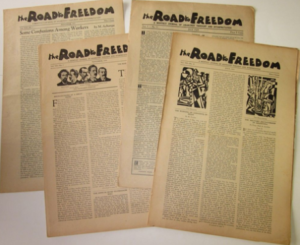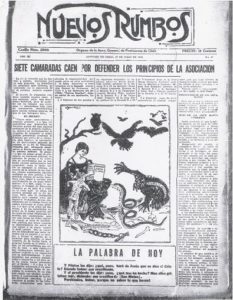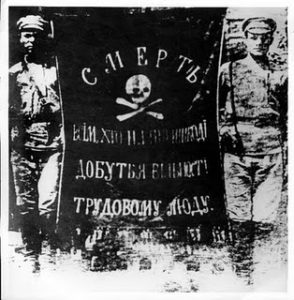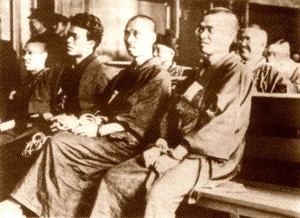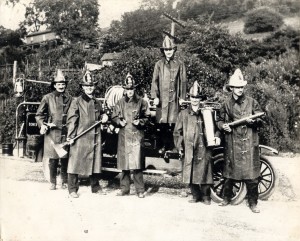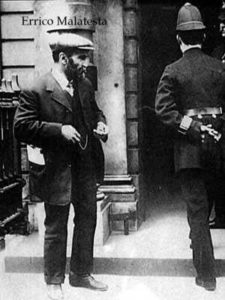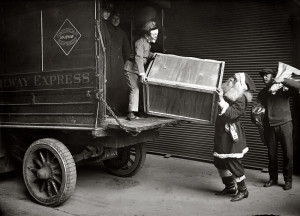We do not know the precise year of Passos’s birth (it was probably towards the end of the 19th century), but, from the books of Edgar Rodrigues, we know that he was born in Rio de Janeiro state. We find his first appearance in social struggles of the time as a UOCC delegate at the 3rd Brazilian Workers’ Congress (1920) at which he was elected as travel secretary for the Brazilian Workers’ Confederation (COB). Passos had been selected for that post because he stood out in the ranks of the organised proletariat on account of his intellect and oratorical gifts which he had honed in the day to day struggles of his trade.
Tag Archives: 1924
Introduction to The Road to Freedom – Paul Buhle
A brief history by Paul Buhle of The Road to Freedom, an anarchist newspaper published out of New Jersey and New York from 1924-1932.
Continue reading Introduction to The Road to Freedom – Paul Buhle
Errico Malatesta e la violenza rivoluzionaria
Alfredo M. Bonanno
Nota introduttiva
Niente come la lettura di questi miei interventi al Convegno anarchico di Napoli su Malatesta del dicembre 2003 può dare l’idea di come ogni tentativo di fornire giustificazioni o condanne riguardo il concetto di violenza rivoluzionaria sia soltanto un tentativo fallito in partenza. La violenza rivoluzionaria non abbisogna delle mie giustificazioni e non può essere intaccata da qualsiasi tipo di condanna, anche se quest’ultima proviene dalle fila stesse degli anarchici.
In fondo il pacifismo è anch’esso un falso problema e non merita di essere confutato ricorrendo a molte parole.
Continue reading Errico Malatesta e la violenza rivoluzionaria
Le Travail est un crime

Herman J. Schuurman
Le Travail est un crime
suivi de: Le groupe “De Moker”, la jeunesse rebelle dans le mouvement libertaire hollandais des Années folles – par Els van Daele
| Paru en décembre 2007 |
Más allá del Estado y los partidos políticos. Los profesores y el movimiento libertario en la región chilena (1922-1932)
Historia del Ejército Negro anarquista en la Guerra Civil Rusa
El Ejército Negro fue un grupo armado de anarquistas con base mayormente ucraniana y uno de los cuatro ejércitos que participaron en la Guerra Civil rusa, donde combatieron además, bolcheviques integrando el Ejército Rojo, pro-occidentales, conservadores y mencheviques agrupados en el Ejército Blanco, y nacionalistas que formaban el Ejército Verde.
Continue reading Historia del Ejército Negro anarquista en la Guerra Civil Rusa
Giroshin Sha – An anarchist-illegalist cell, formed in Japan in the early 20th century
“Giroshin Sha” (Guillotine Society) was an anarchist – illegalist cell, formed in Japan in 1922. This cell expropriated banks, in order to finance its activities.
“Giroshin Sha” attempted to execute the general Masataro Fukuda twice, who was in the group which was responsible for the assassination of the most prominent anarchist writer of his time in Japan, Osugi Sakae.
Repubblica e rivoluzione Errico Malatesta
Il nostro dichiarato proposito di prender parte a qualunque movimento rivoluzionario mirante alla conquista di maggiore libertà e maggiore giustizia, nonché le recenti affermazìoni di qualche nostro compagno, che forse nella redazione frettolosa di articoli di giornale è andato oltre il suo pensiero reale, han fatto credere a qualcuno, ignaro delle nostre idee, che noi accetteremmo, sia pure provvisoriamente, una repubblica, decorata per l’occasione degli aggettivi sociale e federativa.
Continue reading Repubblica e rivoluzione Errico Malatesta
Después de un eventual triunfo insurreccional
Después de un eventual triunfo insurreccional
(Reflexión sobre la violencia post-revolucionaria de Errico Malatesta)
No hablaré de cómo puede ser combatida y derribada la tiranía que hoy oprime al pueblo italiano.
Continue reading Después de un eventual triunfo insurreccional
